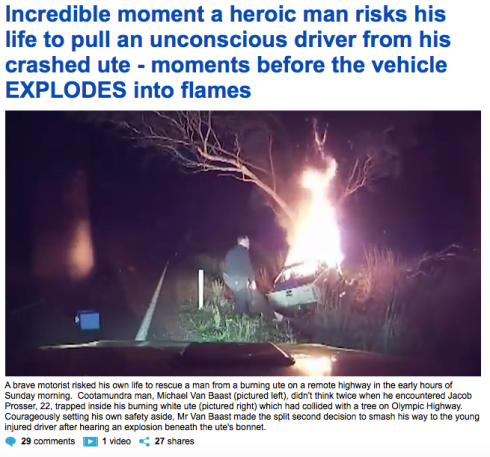Well, it says This Blessed Plot, but it doesn’t look like England to me:

But that’s because this isn’t so much This Blessed Plot as this.blessed.plot – an address (or, really, grid reference) on a new map created by a tech startup and identified not by using numbers, but by using words. In fact, the programmers have divided up the entire world into 57 trillion three-metre squares, and been able to address every one individually with just three words separated with dots (in this case, this.blessed.plot, which, to Shakespeare’s undoubted surprise, is north of Yellowknife in Canada’s Northwest Territories).
The system, known as What3Words, is a sort of ultra-precise postcode map, but with much more user-friendly coordinates, and covering areas of the planet where the only other method of geolocation would be latitude and longitude. Its founder, former musician Chris Sheldrick, told the BBC: “Every day we would go somewhere new and people always got lost. I tried getting my band to use GPS co-ordinates but they were resistant or typed the co-ordinates wrong. I started chatting with a friend who was a mathematician about how we could come up with something that was simple.”
The BBC reports that they came up with a mathematical formula and a list of, remarkably, just 40,000 words to address all the squares. Now, in the manner of aspiring tech companies everywhere, they are appearing at TED, recruiting corporate clients, starting to get some media coverage, and hoping that the whole system takes off.
As an idea, it raises all sorts of fascinating points for debate, such as the use of vocabulary as numbers, and the opportunities for improving global development. But of course the immediate question that comes to mind is: where are the coolest addresses?
Not since the advent of the telegraphic address has there been a chance to have such an easily memorised location: not a zip code or a street name, but a short phrase that gets visitors right to your door while saying something apposite about you. Unlike telegraphic addresses, of course, the labels for the squares are fixed: it would be a question of you moving to the desired location, rather than choosing a code for where you are. Also, it would appear that while the system contains nouns, verbs, adjectives and adverbs, it omits many proper nouns, prepositions, pronouns and articles (so you can’t have a.new.hope or return.of.jedi, but you could have empire.strikes.back).
Nonetheless, if this system catches on, there will be all sorts of opportunities for alert entrepreneurs. move.move.move, near Morristown, NJ, is ideal for a removals service (or a personal trainer), and handy for your wealthy Manhattan clientele. lemon.drizzle.cake would be a sure thing for a cafe, if one were confident that one’s cappuccinos wouldn’t go flat in a rugged Venezuelan national park. Wedding planners could head for lawful.wedded.husband or truly.madly.deeply. Bee Gees fans could set up a mailing address, at least, at spirits.having.flown (Bahia state, Brazil), and one can only imagine the architecture that might be designed at form.follows.function (or perhaps not, seeing as that square is in the middle of the Indian Ocean).
Politically, however, the picture is a little more unhelpful. strong.stable.leader is in Edinburgh rather than London, and education.education.education is nowhere near Islington (it’s on the Bay of Bengal). And what about the biggest and best address of all? Well, star.spangled.banners is actually south of the border in Mexico, and star.spangled.banner is – disconcertingly – in Russia.

Tags: addressing, what3words, words





